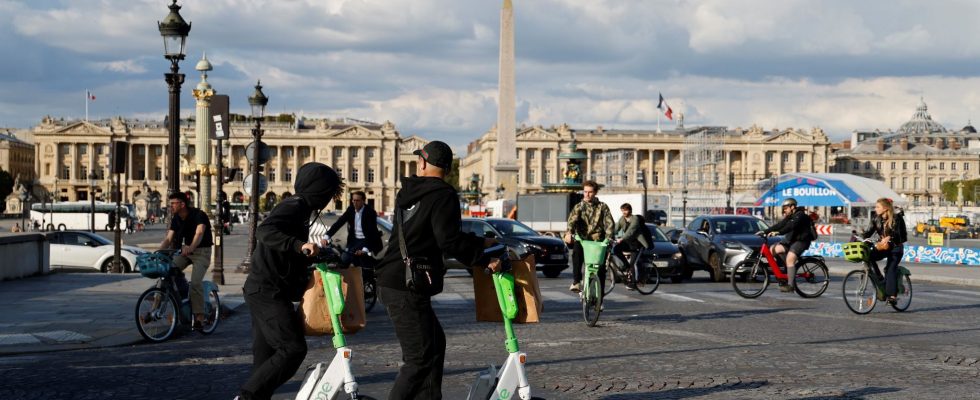It will be necessary to work from home as much as possible during the Paris Olympic Games in the summer of 2024. This is what Valérie Pécresse, president of Ile-de-France Mobilités (IDFM), regional transport authority, asked. . This Thursday, December 7, in a letter to the Ministry of Transport, the president (Les Républicains) of the Ile-de-France region called on “all those who can to telework” during the Olympics, organized from July 26 to August 11, in order to avoid transport embolism.
“We will be ready,” however, wanted to reassure Valérie Pécresse, brushing aside the fears expressed by the prefect of the Ile-de-France region, Marc Guillaume, or even by the socialist mayor of Paris, Anne Hidalgo. “That the government asks Ile-de-France residents who can to telework from August 1 to 12 to avoid transport being overloaded, that’s just travel information,” she downplayed during a press conference. , following the IDFM board meeting.
In a letter sent by Marc Guillaume to Clément Beaune on November 28, revealed by the chained Duck On Wednesday, the prefect warned “that the saturation thresholds will be regularly exceeded” during the Games for 11 metro lines, five RER lines and five Transiliens. “In certain places, the transport plan only allows spectators to be transported if all or almost all other travelers were dissuaded,” worries Marc Guillaume. During the Olympics, around 800,000 spectators per day will have to be transported to the competition venues.
https://www.youtube.com/watch?v=undefined
Leave taken during the Olympics?
“It’s true, there is still work to do,” admitted Minister for Transport Clément Beaune on Franceinfo on Thursday. “For the Ile-de-France residents and Parisians who will be there, who want to go to work, as we have said, we will launch a specific information campaign from January,” indicated the minister. But it will be necessary, “for those who can, more teleworking”, also warned Clément Beaune. He warned in November: “On competition days, it will be difficult to get around Paris.”
Be careful, however, for those who want to take the metro: the ticket price will increase during the Olympics, going from 2.10 euros to 4 euros. The daily pass, available from July 20 to September 8, “will cost 16 euros”, with a decreasing price depending on the number of days, while the weekly pass will be “70 euros”.
The Minister of Transport also encouraged Ile-de-France residents to “take their leave rather during this period – the Olympics – than before or after”. The objective is to “relieve our daily transport a little during this period”, he hoped. Several metro stations should be closed, such as Concorde, Champs-Elysées-Clémenceau and Louvre-Rivoli. Buses were planned to “fluidify” but, as recalled the chained Duckthe RATP is struggling to recruit drivers.
“For us, the subject is the west of the Ile-de-France region,” recalled Valérie Pécresse. The concurrent competitions at the Parc de Princes and Roland-Garros risk overloading line 9 beyond what it can absorb. “We are going to put buses in, encourage people to take the RER C and perhaps we will be able to cross the Bois de Boulogne on foot or go up the Seine on foot, there are worse things in summer,” exclaimed the president of region.
Walking, the best ally of Ile-de-France residents?
Faced with these announced difficulties in getting around by public transport, walking could well prove to be the best ally for Ile-de-France residents. David Belliard wants “a pedestrian Paris for the duration of the Games”, as he declared to BFMTV at the end of September. “The messages according to which we should telework during this period, not use transport… I am not satisfied with them. The Games must also be a great moment for Parisians and not hinder their daily lives”, lamented in September deputy environmentalist in charge of transport and public space in an interview at the Parisian.
Although it will be possible to travel on foot in Paris during the Olympic Games, restrictions on traveling as a pedestrian will nevertheless be present in certain areas hosting the sporting competition. However, no QR code will be required if you are on foot, by bike or on a scooter. This will only be valid for road traffic and in certain locations.
In an interview at the Parisian, On November 28, Laurent Nuñez, Paris police prefect, detailed several security measures for four perimeters close to the competitions during the Olympic Games in the capital, accompanied by varying degrees of restrictions, particularly for traffic. He mentioned, for example, the need to register on a digital platform by providing travel documents, with a QR code to present during checks.
